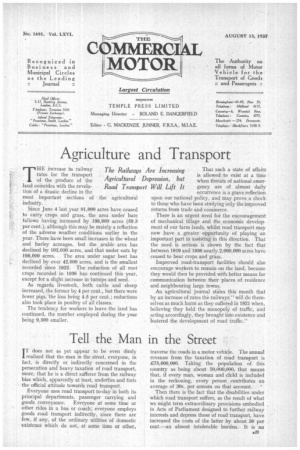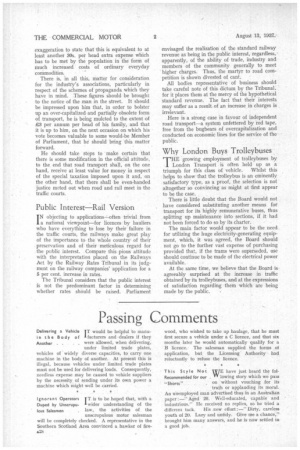Tell the Man in the Street
Page 29

Page 30

If you've noticed an error in this article please click here to report it so we can fix it.
I T does not as yet appear to be even dimly realized that the man in the street, everyone, in fact, is directly or indirectly concerned in the persecution and heavy taxation of road transport, more, that he is a direct sufferer from the railway bias which, apparently at least, underlies and tints the official attitude towards road transport.
Everyone uses road transport to-day in both its principal departments, passenger carrying and goods conveyance. Everyone at some time or other rides in a bus or coach; everyone employs goods road transport indirectly, since there are few, if any, of the ordinary utilities of domestic existence which do not, at some time or other, traverse the roads in a motor vehicle. The annual revenue from the taxation of road transport is £75,000,000. Taking the population of this country as being about 50,000,000, that means that, if every man, woman and :child is included in the reckoning, every person contributes an average of 30s. per annum on that account. e Then there is the fact that the disabilities under which road transport suffers, as the result of what we might term extraordinary provisions embodied in Acts of Parliament designed to further railway interests and depress those of road transport, have increased the costs of the latter by about 30 per cent.—an almost intolerable burden. It is no exaggeration to state that this is equivalent to at least another 30s, per head extra expense which has to be met by the population in the form of much increased costs of ordinary everyday cornmodities. There is, in all this, matter for consideration for the industry's associations, particularly in respect of the schemes of propaganda which they have in mind. These figures should be brought to the notice of the man in the street. It should be impressed upon him that, in order to bolster up an over-capitalized and partially obsolete form of transport, he is being mulcted to the extent of £3 per annum per head of his family, and that it is up to him, on the next occasion on which his vote becomes valuable to some would-be Member of Parliament, that he should bring this matter forward. He should take steps to make certain that there is some modification in the official attitude, to the end that road transport shall, on the one hand, receive at least value for money in respect of the special taxation imposed upon it and, on the other hand, that there shall be even-handed justice meted out when road and rail meet in the traffic courts.
Public Interest—Rail Version I N objecting to applications—often trivial from a national viewpoint—for licences by hauliers who have everything to lose by their failure in the traffic courts, the railways make great play of the importance to the whole country of their preservation and of their meticulous regard for the public interest. Compare this pious attitude with the interpretation placed on the Railways Act by the Railway Rates Tribunal in its judgment on the railway companies' application for a 5 per cent, increase in rates. The Tribunal considers that the public interest is not the predominant factor in determining whether rates should be raised. Parliament envisaged the realization of the standard railway revenue as being in the public interest, regardless, apparently, of the ability of trade, industry and members of the community generally to meet higher charges. Thus, the martyr to road competition is shown divested of cant. All bodies representative of business should take careful note of this dictum by the Tribunal. for it places them at the mercy of the hypothetical standard revenue. The fact that their interests may suffer as a result of an increase in charges is irrelevant. Here is a strong case in favour of independent road transport—a system unfettered by red tape, free from the bugbears of overcapitalization and conducted on economic lines for the service of the public.
Why London Buys Trolleybuses THE growing employment of trolleybuses by London Transport is often held up as a triumph for this class of vehicle. Whilst this helps to show that the trolleybus is an eminently satisfactory type, as a proof, the selection is not altogether so convincing as might at first appear to be the case. There is little doubt that the Board would not have considered substituting another means for transport for its highly remunerative buses, thus splitting up maintenance into sections, if it had not been forced to do so by its charter. The main factor would appear to be the need for utilizing the huge electricity-generating equipment, which, it was agreed, the Board should not go to the further vast expense of purchasing provided that, if the trams were superseded, use should continue to be made of the electrical power available. At the same time, we believe that the Board is. agreeably surprised at the increase in traffic obtained by its trolleybuses, and at the expressions of satisfaction regarding them which arc being made by the public.




















































































